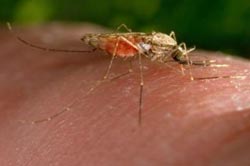NIH-funded scientists identify potential target for malaria drugs

Malaria is transmitted to humans via the bite of a Plasmodium-carrying mosquito.<br><br>Credit: CDC/Jim Gathany<br>
Researchers have identified the protein in malaria-causing Plasmodium parasites that is inhibited by a newly discovered class of anti-malarial compounds known as imidazopyrazines.
The protein, phosphatidylinositol 4-kinase (PI4K), is the first potential malaria drug target shown to be essential to all stages of the Plasmodium life cycle; imidazopyrazines impede its activity throughout this process. Led by Elizabeth Winzeler, Ph.D., of the University of California, San Diego and Novartis Research Foundation, the research was published online today in Nature. The work was supported by the National Institute of Allergy and Infectious Diseases (NIAID), part of the National Institutes of Health, and other organizations.
When a Plasmodium-carrying mosquito bites a human, it transmits infectious parasites that travel to the liver, where they multiply and mature, and then spread throughout the bloodstream, causing malaria symptoms to develop. Dr. Winzeler and her colleagues administered imidazopyrazines to mice and nonhuman primates infected with Plasmodium and found that the compounds blocked the parasites' development both in the liver and in the bloodstream stages of infection.
They also exposed Plasmodium parasites directly to imidazopyrazines and searched for genetic differences between parasites susceptible to the compounds and those that were resistant. They found that the imidazopyrazine-resistant parasites had mutated versions of the gene that codes for PI4K.
Currently, only one drug, primaquine, has been approved for elimination of liver-stage parasites for the treatment of relapsing malaria. Knowing that PI4K makes Plasmodium parasites susceptible to imidazopyrazines during the liver and bloodstream stages should help researchers optimize these compounds for future clinical testing in humans, the study authors write.
ARTICLE: McNamara CW et al. Targeting Plasmodium PI(4)K to eliminate malaria. Nature. DOI: 10.1038/nature12782 (2013).
Martin John Rogers, Ph.D., Program Officer, Parasite Drug Development, in NIAID's Parasitology and International Programs Branch, is available to discuss the findings.
To schedule interviews, please contact Nalini Padmanabhan, (301) 402-1663, padmanabhannm@niaid.nih.gov.
Media Contact
More Information:
http://www.niaid.nih.govAll latest news from the category: Health and Medicine
This subject area encompasses research and studies in the field of human medicine.
Among the wide-ranging list of topics covered here are anesthesiology, anatomy, surgery, human genetics, hygiene and environmental medicine, internal medicine, neurology, pharmacology, physiology, urology and dental medicine.
Newest articles

Superradiant atoms could push the boundaries of how precisely time can be measured
Superradiant atoms can help us measure time more precisely than ever. In a new study, researchers from the University of Copenhagen present a new method for measuring the time interval,…

Ion thermoelectric conversion devices for near room temperature
The electrode sheet of the thermoelectric device consists of ionic hydrogel, which is sandwiched between the electrodes to form, and the Prussian blue on the electrode undergoes a redox reaction…

Zap Energy achieves 37-million-degree temperatures in a compact device
New publication reports record electron temperatures for a small-scale, sheared-flow-stabilized Z-pinch fusion device. In the nine decades since humans first produced fusion reactions, only a few fusion technologies have demonstrated…





















